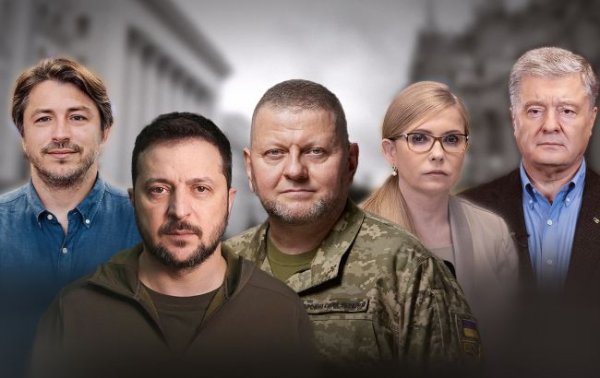
Sergei Pritula, Vladimir Zelensky, Valery Zaluzhny, Yulia Tymoshenko and Petro Poroshenko (photo: RBC-Ukraine Collage) Author: Milan Lelic, Ulyana Bezpalko
Due to the actual stagnation of peace talks, the dates of the first post-war elections have also shifted from spring to autumn. Whether Volodymyr Zelensky and Valeriy Zaluzhny will go to the elections, what the current mood is in Ukraine's leading parties and what they are preparing for – read the article by RBC-Ukraine journalists Milan Lelich and Ulyana Bezpalko.
Content
- The Rise of Zelensky
- Request for military
- Election Problems
- What is European Solidarity concerned about?
- What's happening in “Batkivshchyna”
- What's up with Dmitry Razumkov's party and how is Klitschko's UDAR living?
- The future of the white-blue camp
- What changes will there be in “Servant of the People”
“This is all a mouse-fight – parties, elections – compared to the negotiations and conditions that will be set for us. They will ultimately determine the framework in which the elections will be held,” one of the opposition MPs told RBC-Ukraine last week.
The next day, a completely similar thesis was voiced by a prominent deputy from the ruling party. According to him, a couple of months ago, many deputies from the Servant of the People party were taken in by Donald Trump's assurances that he would end the war in Ukraine in no time. And now they are overcome with severe frustration.
“We also have “Trumpists” who communicate with the relevant senators and congressmen, who told them all this. And now the senators come to them and ask themselves: so what to do, what's the plan? And everyone realized that no one has a plan,” the deputy says.
That is why there is noticeably less talk about elections in the political corridors than a couple of months ago. Given the powerful shelling of recent times, in order to firmly believe in some kind of truce, it needs to last at least a couple of weeks – and this is not even on the horizon yet.
Although, of course, the topic of elections has not completely disappeared, as it has for the last three years. Moreover, the belief that Trump, whether by concessions or threats, will be able to bring things to at least some real truce, has not disappeared either. It’s just that the timing has shifted – if earlier they were discussing the end of May, now they are actively talking about autumn.
“Everyone is preparing for the elections except us” – RBC-Ukraine has heard this phrase from many pro-government deputies recently. Although, of course, the President's Office is also actively keeping the election issue in mind – even if it is clearly not in first place.
The Rise of Zelensky
Trump's attacks on Volodymyr Zelensky in February-March led to the well-known effect in political science – “rallying around the flag”, when the level of support for the country's leader increases sharply during an international crisis. According to polls by the Kyiv International Institute of Sociology, in a matter of weeks the balance of trust-distrust in the president increased from +20% to +41%.
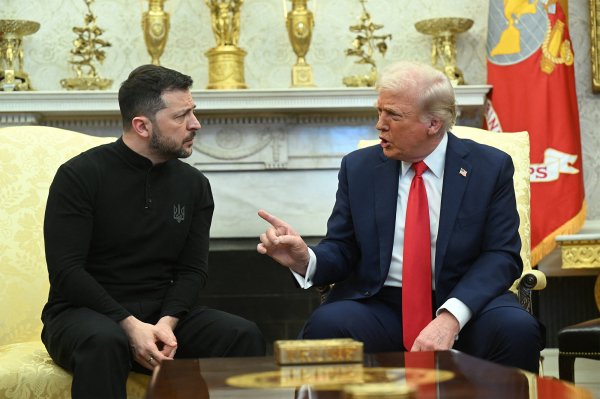
Volodymyr Zelensky and Donald Trump during an argument in the Oval Office (Photo: Getty Images)
The level of trust in a politician is not identical to his political rating, but this indicator has also improved significantly for Zelensky, according to data from closed polls, the results of which were made available to RBC-Ukraine. The president's rating has grown to such an extent that for the first time he began to outpace his main potential opponent in the first round – former commander-in-chief and ambassador to London Valeriy Zaluzhny.
However, the data from different polls differ. In one of them, Zelensky beats Zaluzhny in both the first and second rounds. In another, he overtakes him in the first round, by about 5-10%, but still loses in the second. “Zaluzhny wins the second round due to the accumulation of all those dissatisfied with Zelensky. Zelensky's ceiling so far is about 35%,” says an informed source of RBC-Ukraine.
Against the backdrop of a noticeable increase in support for Zelensky among ordinary SN deputies, rumors have been circulating that in the changed situation, Bankova will begin to pedal the topic of elections, trying to catch a favorable moment. And the elections themselves, as soon as the external situation allows (relative truce), will be held at the fastest pace possible, as far as the law allows.
Yesterday, March 30, the British publication The Economist came out with a resonant publication on this topic, whose sources also said that Bankova is determined to hold elections as soon as possible, and even named specific dates – July of this year (provided that a truce can be achieved before April 20 – Easter). However, RBC-Ukraine's interlocutors in the government still call these reports rumors and deny that substantive preparations for the blitz elections have begun.
But purely theoretically, holding elections in an accelerated mode could definitely play into Zelensky's hands – potential competitors simply won't have time to come to their senses and promote their campaign. Except for one, who doesn't need promotion in principle – the same Valeriy Zaluzhny.
Request for military
Zaluzhny's participation or non-participation in the elections is still the main factor of uncertainty. And the former commander-in-chief himself is in no hurry to clarify the situation in conversations with numerous emissaries from Kyiv political circles.
The lack of specifics always gives rise to rumors. In the case of Zaluzhny, some claim that he will definitely run in the presidential elections, others – that he is inclined to run in the Rada elections at the head of Zelensky's political force, and still others claim that Zaluzhny will not run in the elections at all – precisely because of his recent ratings.
The fact is that against the backdrop of the current crisis in relations with the United States and the constant problems that the Trump administration is creating for Ukraine, the former commander-in-chief – unlike Zelensky, who is in the center of events 24/7 – has not particularly distinguished himself. The day after the scandal in the Oval Office, Zaluzhny posted a photo of him and Zelensky shaking hands, and a few days later he gave a speech about the destruction of the “old world order.” And that's basically it.
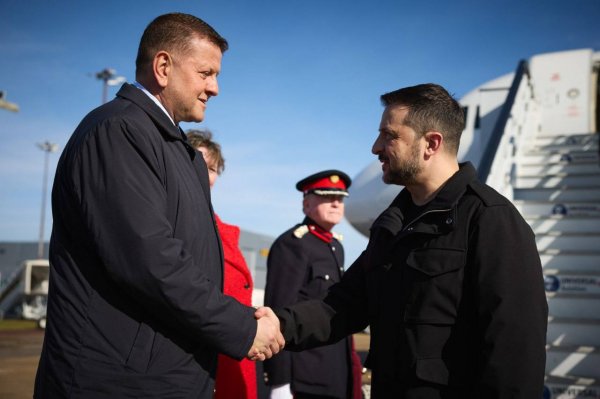
Probably, due to his physical absence from Ukraine, the former commander-in-chief began to fall somewhat out of the general agenda of what the country lives by. And even with the current level of technological development, this was probably inevitable.
However, there is another opinion on this matter. “We have never chosen presidents rationally. In fact, now there is no alternative left except Zaluzhny, the authorities have completely cleared the field. And Zaluzhny absorbs the feeling of hope, and people always need hope. Just like Yushchenko did in his time,” one of the opposition deputies reasons. Moreover, Zaluzhny has a ready-made formula, very attractive to many Ukrainians, with which one can go to any elections: no matter how difficult it is for us, we will definitely not be ashamed.
Zaluzhny himself, when asked by RBC-Ukraine to comment on rumors that he might run for office with Zelensky's party, or that he might have decided not to participate in the elections at all, responded as follows: “My answer on this matter has not changed. While the war is going on, we all need to work to preserve the country, and not think about the elections. I do not comment on various rumors.”
In any case, the military's niche in politics will not remain empty. It could be occupied by Kirill Budanov's yet-to-be-created party, a potential project of the military from the 3rd Assault Brigade (currently a corps) or from the Azov Brigade led by Denis Prokopenko. None of them have declared their intentions to go into politics, although current polls give them quite good chances.
Election Problems
In any case, according to the established opinion in the political establishment, the presidential elections will be held first, and the parliamentary elections will follow. At the same time, local elections, as they say both in the government and in the opposition, may well take place according to schedule – this fall, as planned. They may become a kind of test of how Ukraine is capable of holding any elections and solving related problems in the current conditions.
The list of problems has long been known, and it, among other things, can disrupt plans for holding presidential elections in blitz mode, if such ideas are nevertheless attempted to be implemented. This is complete chaos with the voter registers (it is simply unknown where and how many Ukrainians live after the mass migrations during the war), destroyed infrastructure, military and refugee voting abroad, etc.
Given that millions of voters are now abroad, their votes could potentially completely turn any electoral scenario upside down. But even in the fourth year of the Great War, there was no real solution to technically give them the opportunity to vote.
“Many people say that we should give these people the opportunity to vote in any case, because they are our people. But I don't think anyone will run after them,” says an influential deputy from “Servant of the People.” The fact is that although it is technically impossible to conduct any social surveys among refugees, by general opinion, they are generally quite critical of the current government. Which, of course, reduces the motivation to look for some sophisticated electoral solutions for them.
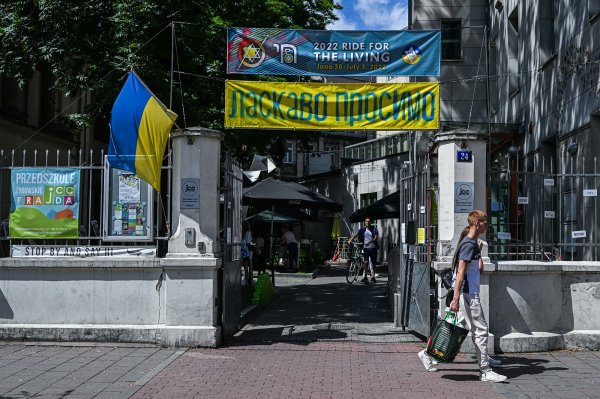
Refugee centre in Poland (Photo: Getty Images)
Even the Central Election Commission has no idea how to solve technical problems related to the elections, although some deputies were counting on it. But the CEC's position during a recent conversation with MPs boiled down to one thing: whatever election law you adopt, that's how we'll organize everything, says one of the MPs from the ruling party.
Of course, the timing of the presidential elections is completely tied to peace talks and the possibility of a truce/peace – no one will vote during the active phase of the war, there is a consensus on this.
Therefore, in the best-case scenario, the presidential elections, as the simplest (few candidates, single ballot paper across the country), are considered to be likely to take place in the fall, while the parliamentary elections may be pushed back to next year. Behind the scenes, they are already talking about March 2026.
Despite the fact that the election prospects are still completely foggy, unofficial preparations for them are still underway. Although slowly – few people want to seriously invest in the elections now and then wait indefinitely for the return on their investment.
What is European Solidarity concerned about?
The most prominent opposition political force, European Solidarity, has recently focused on two areas: the fight against sanctions against its leader Petro Poroshenko and criticism of the way the government is negotiating with the Americans.
The unexpected introduction of sanctions against Poroshenko did not cause such a stir in Europe as his allies had apparently hoped. And it is not surprising – the European Union has too many other concerns right now, and any criticism of Ukraine in the current geopolitical conditions seems inappropriate to Europeans. However, the “EU” continues the fight on the domestic front, having collected 145 thousand signatures for the lifting of sanctions against the ex-president.
As a source in his faction tells RBK-Ukraine, the sanctions and criminal pressure on Poroshenko may pursue several goals: ultimately, to take away the assets belonging to the ex-president, to complicate his financing of any elections, and also to simply occupy his time and energy with fighting in the courts, instead of purely political activity. The option in which the EU leader will ultimately end up behind bars in one of the cases is considered very likely in his party – and the publication's sources from “Servant of the People” agree with them on this.
In addition, “European Solidarity” is sure that on the most important foreign policy track, in the negotiations with the Americans on peace and truce, the government is making mistake after mistake, which will ultimately drive Ukraine into a dead end. “The freeze that everything is heading towards will obviously be worse, by all parameters, than the Minsk agreements were for us. And the government has criticized Minsk so many times over the years that this option is very triggering for them,” the EU MP reasons.
What's happening in “Batkivshchyna”
A number of interlocutors in various political forces, both from the government and the opposition, unanimously assured RBC-Ukraine that the topic of elections in Ukraine is being most actively promoted by Yulia Tymoshenko. And she is even allegedly looking for disappointed deputies from other forces in the hall, offering them to join “Batkivshchyna”. The party itself says that it is ready to consider the candidacies of those who wish to, if such appear, but they themselves are not “luring” anyone.
“According to the agreements reached between political forces within the framework of the “Jean Monnet Dialogues”, the vote may take place no earlier than six months after the lifting of martial law. Another important issue in this regard is financing. According to the calculations that were presented to us, holding one election will cost about 3.5 billion hryvnia. In our opinion, in order to save money, three elections should be held simultaneously – presidential, parliamentary and local,” one of the representatives of “Batkivshchyna” tells RBK-Ukraine.
However, the issue of saving money in this case is secondary, and the authorities will definitely not agree to hold three elections at once – it is too risky. If Russia decides to violate the ceasefire on the eve of the election day and launches a new offensive, it is difficult to even imagine the scale of the internal political chaos in this case.
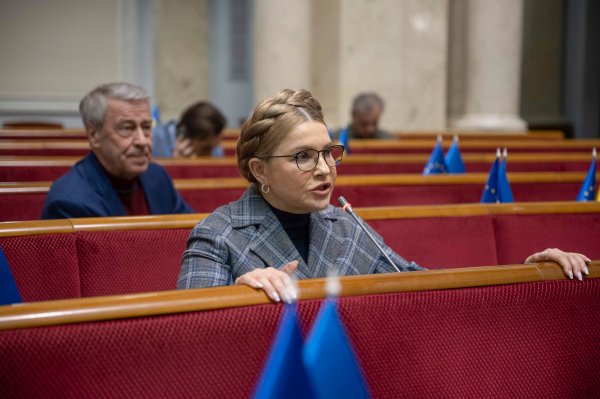
Yulia Tymoshenko (photo: Getty Images)
At the same time, a number of the publication's interlocutors in the political arena note that Batkivshchyna has recently become close to Bankova and is synchronizing its actions and statements with the OP. This became especially loudly discussed after Tymoshenko stood up for Zelensky when Trump called him a “dictator”. Although, it should be noted that other politicians also spoke out in support of the Ukrainian president. Batkivshchyna itself denies playing along with the Presidential Office and claims that it is ready to support Zelensky if he takes the “right steps”. At the same time, rumors are circulating behind the scenes that Tymoshenko could allegedly become a “transitional prime minister”. But it is not hard to guess who is spreading them.
What's up with Dmitry Razumkov's party and how is Klitschko's UDAR living?
Tymoshenko's electoral field overlaps to some extent with the electoral field of former Verkhovna Rada Speaker Dmytro Razumkov, whose rating is now at the level of the passing barrier. According to SN, immediately after his removal from the post of speaker in October 2021, a regional network of various dissatisfied “servants” at the local level formed around Razumkov, and now he is allegedly trying to restore it. In addition, the ex-speaker and his associates have been actively traveling around the regions lately, which has fueled rumors about their preparations for the elections.
“Rumors that we have taken up some kind of preparation for the elections can only be explained by our recent trips to the western regions. There really was a delegation of five MPs there. But this is not connected with preparation for the elections – we are simply alternating trips to the front and to the rear regions,” one of the MPs from Razumkov's team tells RBK-Ukraine.
Talks about their future and the format of participation in politics and in the team of Kyiv Mayor Vitaliy Klitschko, which has been pretty battered by recent criminal cases, have intensified. For now, UDAR's public activities are focused on the Ukrainian Team charity foundation. But a source close to the mayor says that UDAR is unlikely to undergo a corresponding rebranding.
“Our baseline scenario is that the negotiations fail and there will be no elections this year. And in the case of local elections – if they do not take place on schedule – there are some nuances. Because the law regulates the legitimacy of the president and the Rada after the expiration of their term of office during martial law, but does not regulate the powers of local bodies,” Klitschko says.
The law states that elections to local councils, mayors or mayors cannot be held during martial law. However, there is no mention anywhere that they can continue to exercise their powers until new elections, as is the case with the president and parliament.
It turns out that the term of office of all current local authorities will end in December of this year. If there are no regular local elections in the fall and the Rada has not come up with some legal formula by that time to ensure their legitimacy, Bankova will have to create military administrations at the local level. And this carries its own risks for local self-government, a source close to Klitschko believes.
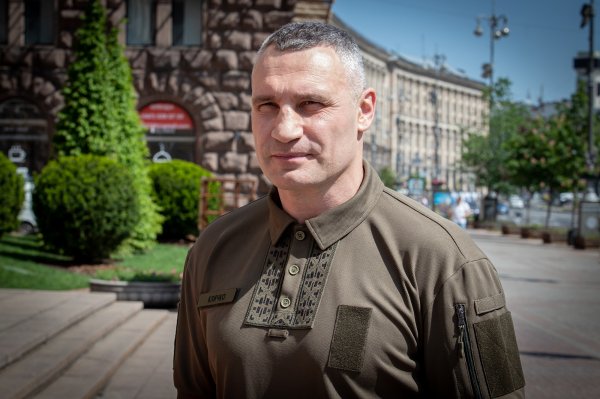
Vitali Klitschko (Photo: Getty Images)
The political establishment says that the Kyiv mayor is again trying to establish horizontal relations with various local elites, for example, Borys Filatov from Dnipro and former Prime Minister Volodymyr Groysman, who traditionally has strong positions in the Vinnytsia region. But an interlocutor in Klitschko's entourage claims that such a structure was relevant five years ago, when the idea of creating a “party of mayors” was born – but it did not work out. “In theory, this cannot be ruled out in the future. But for now there are definitely no current negotiations with anyone,” he says.
The future of the white-blue camp
The former OPZZh, an electoral field that has not disappeared even after all the events of recent years, is also thinking about its re-preservation in politics for another cycle. But there is no understanding of its future there yet.
Previously, they admitted that they could go to parliamentary elections, forming a conditionally new party, headed by one of the current MPs, Yuriy Pavlenko.
“Pavlenko is also an active military man, he has a reputation as a pro-Ukrainian politician. But it will take a long time to promote him. So, most likely, if such a party does exist, it will be led by Boyko,” says a source in the former “Platform”.
The political uncertainty of the so-called “white-blue” camp is connected not only with what public sympathies and demands will be at the start of the election campaign, but also with when these elections will take place in principle.
“Despite the fact that the negotiation process now seems to be drawn out, later everything can go much faster. Therefore, I am inclined to believe that we will come to some kind of ceasefire in the fairly near future. Moreover, I think that somewhere from May we will see a revival of the pre-election processes,” they say in the former OPZZh.
According to their estimates, the first elections – both presidential and parliamentary – could take place this year. However, they will take place between the ceasefire and the formal end of the war, since Russia, and along with it, the United States, could push for this. In principle, Vladimir Putin's latest statements about introducing “external control” in Ukraine to hold elections there correspond to this concept.
What changes will there be in “Servant of the People”
The ruling party, although it also assures that it is not preparing for the elections, certainly has some plans for its future parliamentary list. Of course, everything depends on whether Zelensky himself will ultimately run in the elections and, if so, whether he will be able to win. For now, his entourage assures that Bankova has no “plan B” in case the ratings still show Zaluzhny winning in the second round.
“Many of us say that in any case it would be worth going to the elections, and even if we don't win them, then at least give impetus to the parliamentary elections and ultimately get a good faction. Although I don't see any desire on Bankova to get involved in anything other than winning,” an influential MP from SN tells RBC-Ukraine.
“Servants of the People”, and from different internal groups, confirm that the list of Zelensky's party in the elections will be a hodgepodge of 5-10 top “servants” of the current convocation, Andriy Yermak's people, volunteers and military personnel, various opinion leaders and stars from different spheres. One of the interlocutors even compared this list with “Our Ukraine” of 2006, where singers and writers sat in the Rada along with businessmen and “any friends”.
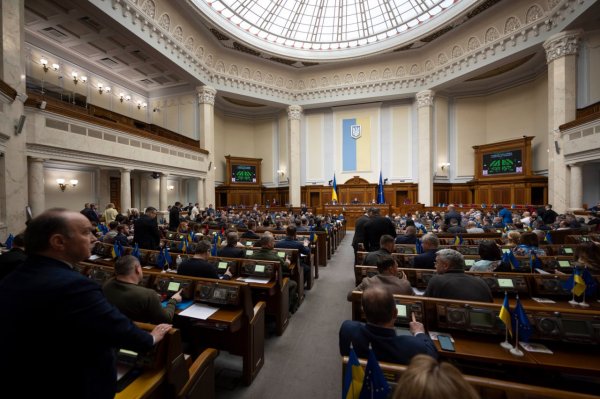
Verkhovna Rada session (photo: t.me/verkhovnaradaukrainy)
According to a prominent deputy from SN, in a jump this party, according to estimates, can gain up to 30%, under the most favorable conditions. This will definitely not be enough to form a mono-majority, so it will be necessary to look for partners. So far, the most likely is the potential political project of the famous volunteer Serhiy Prytula, here the opinions of various “servants” also converge.
But the main idea of the campaign is more or less clear. Promising the return of the territories seized by Russia is a priori a task that is hardly feasible in the short-medium term, so the party will focus on something more achievable – joining the EU.
“We will bring you into the European Union – this is, in fact, the only big idea that can hook people. Like Poroshenko promised to end the war in 2014,” says one of the SN MPs.
However, he adds, now elections have even taken a back seat in discussions between deputies; everyone is concerned about the same things as other Ukrainians: what our future will be like, how long this conditional peace or truce will last, what plans can be made.
Indeed, it is still completely unclear whether it will be possible to conclude any stable peace agreement with the aggressors. Or, as in Korea, there will be a truce lasting for decades, which could potentially be destroyed at any moment.
“And the main question is: do we have a future at all?” concludes the deputy from the ruling party.
